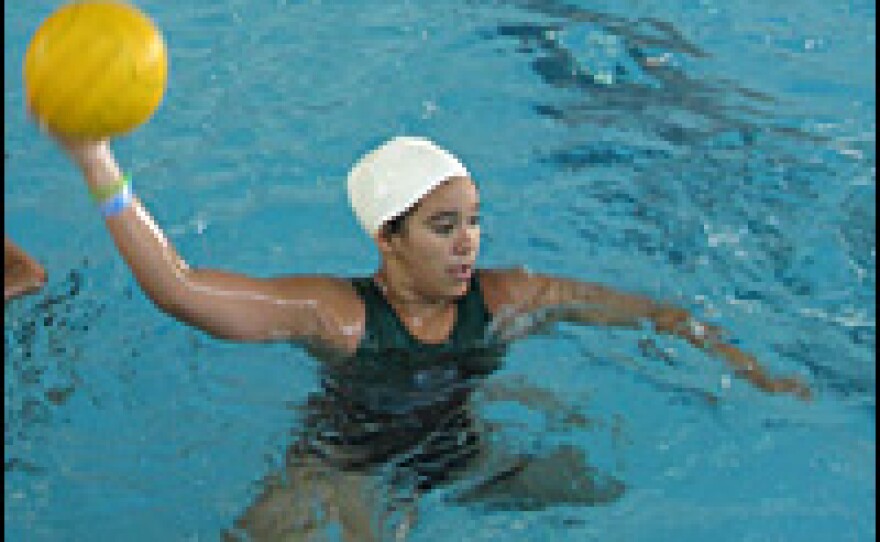
At 4 o'clock on a hot summer afternoon, lap and recreational swimmers are forced from the public swimming pool in Commerce, Calif., so the water polo can begin.
For more than three hours, about 200 kids ages 9 to 16 tread water, sprint during fast breaks and practice passing and shooting the ball. They work out in a palatial $20 million Aquatorium, built for water polo and swimming.
While elite water polo players can swim as much as three miles during a game, lifeguard and water polo mom Patricia Orozco doesn't have to nag to get her polo-playing brood to practice.
"I didn't have to tell my kids, 'Get up.' They got up on their own," Orozco says. "They were telling me, 'Let's go, Mom! We got games. We got practice.' So it was something that they just enjoyed doing."
Orozco's daughter, Priscilla, is an attacker for UCLA and played on the club team in Commerce, which won the silver medal in the Junior Olympics last year. Patricia says Priscilla, who is 19, is aiming for the 2012 Olympics.
The teams, the pool, competition fees and travel to competition are all free. The city pays the bills and has five water polo coaches on the payroll. This is not a wealthy or white beachside enclave — Commerce is inland and industrial, with a population that is 93 percent Hispanic, and has a median household income of less than $40,000 a year.
'The Next Big Thing'
"It brought families together," recalls Bobby Contreras, the full-time coach of the Commerce boys team. He was there around 20 years ago when the water polo craze began. "The city loved it," he says. "It was like the next big thing. And it's just taken off since."
Local legend credits bored swimmers and a visionary coach for the game's dramatic growth in a small city of 12,500.
One day, as the story goes, swim coach Sandy Nitta decided to make practice more lively with a game of water polo, using trash cans for goals. And though Nitta has since left Commerce, her legacy remains — two of the 13 players on the U.S. Women's Olympic Water Polo Team came from the Commerce program.
The two, attacker Patty Cardenas and captain and two-time Olympic medalist Brenda Villa, are Commerce alums and local heroes. They inspire the kids still flocking to water polo in Commerce, and everyone simply calls them "Brenda and Patty."
"We didn't really think that Brenda or Patty [would] be able to make the Olympics because they were short," says 11-year-old Laura Jimenez, who is dripping wet as she takes a break from practice to talk.
"Then Brenda and Patty showed them that [their size] didn't really count. And then they just showed their talent. And now [that] they're in the Olympics, I think that I have a pretty good chance to go to the Olympics, too," Jimenez says.
Anna Reece, 12, is also excited about the hometown Olympians.
"They're really a big inspiration," Reece says. "They make us work harder because they show us that if they can do it, then we can do it."
The women's Olympic water polo tournament begins Aug. 11. The U.S. women face off against China in a game that begins at 5 p.m. Beijing time. That's 2 a.m. in Commerce, but the city is still planning to put up a massive screen so the water polo kids, parents and coaches can watch the game together.
The American women are the reigning world champions, so they're capable of winning a gold medal. Gabriel Martinez is the girls' coach in Commerce. He's been thinking about what the turnout might be like for the gold medal game, even though it's scheduled at 3:20 a.m. Pacific time.
"I think it'd be standing room only to see that game live on a big screen," Martinez predicts. "To watch two kids that they've seen grow up, or two neighbors, or two cousins or two friends that they went to school with, playing in the gold medal game in the Olympics, would be awesome for us."
And it would probably attract even more kids to the Aquatorium in Commerce, the little city with deep passion and big hopes for water polo.
Copyright 2022 NPR. To see more, visit https://www.npr.org. 9(MDAzMjM2NDYzMDEyMzc1Njk5NjAxNzY3OQ001))






